Israel’s Campaign of Repression & Terror Included a ‘Torture Room’ in Nazareth Police Station
Despite Video of the Beating Up of 50 Palestinian Prisoners in Ketziot Prison Israeli Police Were Unable To Find Out Who Was Responsible!
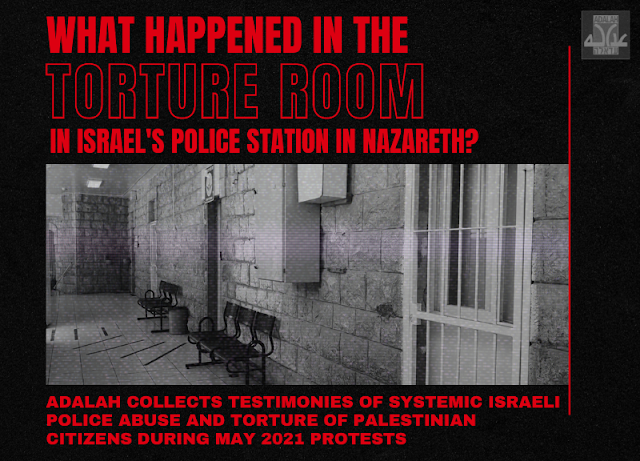
When Human Rights Watch’s Report ‘A Threshold Crossed – Israeli Authorities and the Crimes of Apartheid and Persecution was published the Board of Deputies, who style themselves ‘the Voice of the UK Jewish Community’ leapt into action.
Marie van der Zyle described the Report as ‘a sham which puts rhetoric above fact.’ Van der Zyl emphasised that Israeli Palestinians were ‘fully-enfranchised’ and that
‘Israel’s Arab citizens have been appointed as ambassadors, professors, Supreme Court judges, hospital directors, and other key roles throughout Israel’s socio-economic landscape.’
This is the usual excuse for Israeli Apartheid, as if the appointment of a token Israeli Palestinian as ambassador to a nondescript country justifies the entrenched discrimination against Israel’s Palestinian citizens and the violence that it metes out to them.
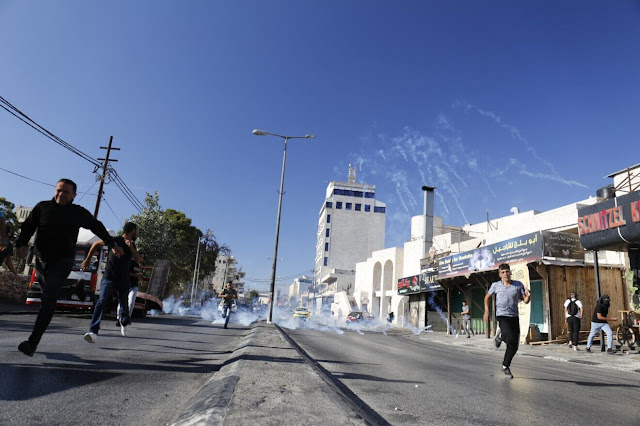
Israeli police chase protesters
The report by Adalah, the Israeli Palestinian Legal Centre, What happened in the ‘torture room’ at Israel’s police station in Nazareth?’ makes disturbing reading.
Israel is the only country in the world where torture is legally sanctioned. As Amnesty International noted, Israeli judges are complicit in the use of torture. Only in very rare cases where the same methods are used against Jews are Israel’s judges prepared to rule that such confessions are inadmissible.
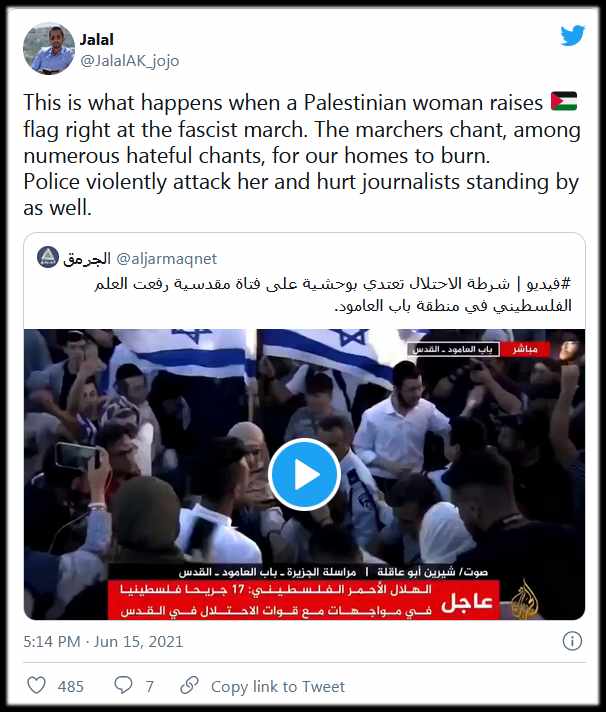
The pretext for torture is the ‘ticking time bomb’ scenario, a pretext that Israel’s colonial judges dreamt up in order to allow Shin Bet, the Internal Security Service and the Police to continue to torture Palestinians. That the so-called representatives of the Jewish community in Britain are prepared to justify all actions of the Israeli state, calling their critics ‘anti-Semitic’, is shameful but not surprising.
The Board of Deputies Constitution enjoins it to ‘Take such appropriate action as lies within its power to advance Israel’s security, welfare and standing’ regardless of what it does. By claiming to speak on behalf of all British Jews the Board actively does its best to increase anti-Semitism.
The IHRA misdefinition of anti-Semitism says that it is anti-Semitic to ‘Holdi(negligence) Jews collectively responsible for actions of the state of Israel’. I agree and its equally anti-Semitic to support Israel on behalf of all Jews.

The Torture Room in Nazareth Police Station
Adalah’s attorneys described the violence handed out to Palestinians in Nazareth during the attack on Gaza and the attacks on them. Palestinians were grabbed off the street and held in the station:
Israeli “police officers led the detainees to a room located on the left side of the entrance corridor to the station, forcing them to sit on the floor handcuffed, to lower their heads towards the floor, and began to beat them on all parts of their bodies, using kicks and clubs, slamming their heads against walls or doors, and more. Officers wounded the detainees, terrorized them, and whomever dared to lift his head upwards risked more beatings by officers. According to affidavits, the floor of the room was covered in blood from the beatings.”
The report says that
Most of the violent arrests of and attacks on Palestinian citizens of Israel in the city were carried out by Israeli special police forces, including undercover mista’aravim officers posing as Palestinians. Israeli officers would continue beating, shoving, and choking detainees while walking them from the scene of their arrest to the city’s police station.
Israeli police in Nazareth even attacked Palestinian lawyers attempting to provide legal help as well as children. This is the answer to apologists for Apartheid like Marie van der Zyl Given the Israeli police record of exonerating their colleagues, we can be sure that no action will be taken or prosecutions brought.
Israeli Prison Violence
Torture in Ketziot, an Israeli Prison
This comes in the wake of an article describing what happened in Ketziot Prison in 2019 ‘Israeli Officers Were Filmed Beating Palestinian Inmates. No One Arrested, Case Closed:
‘At least 10 officers were filmed beating prisoners and dozens more were present, in one of the most violent events to ever take place in an Israeli jail. Only four officers were questioned, none were arrested.’
The evidence is on camera, as you can see, but the Police Investigation Unit was only concerned to protect the prison officers. In the videos the faces of at least 2 prison officers can clearly be seen.
If it was impossible to identify those involved then the obvious action would have been to dismiss every single prison officer. The continued employment of these thugs as prison guards could not be tolerated. But the authorities were not interested in punishing those responsible.
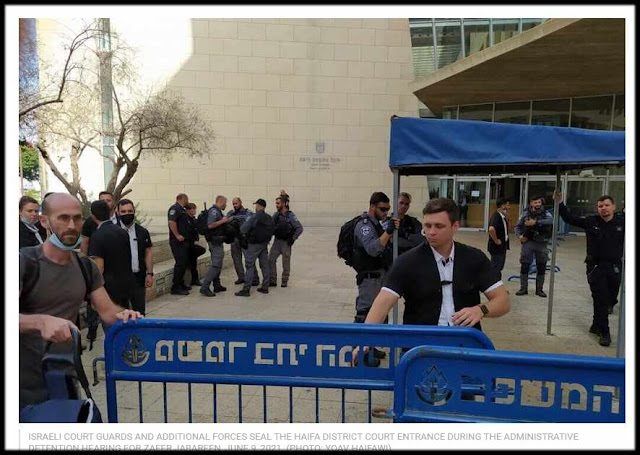
Guards at Haifa Court seal off the entrance whilst an Administrative Detention hearing was taking place
Administrative Detention
Under Israel’s ‘emergency laws’ which date from the British Mandate, prisoners can be gaoled without trial for up to 6 months renewable at a time. This is a law that only police states possess.
Until recently this had been used mainly against Palestinians in the Occupied Territories but now it has begun to be used again Israeli Palestinians (not Jews of course).
Demonstration against Administrative Detention
It was reported that on June 4, as part of a mass detention campaign in Umm al-Fahm, the police arrested Zafer Jabareen, a former security prisoner. Benny Gantz, the Defence Minister, then signed a four month prison sentence. This is the face of Israel’s new government. But when your judge is your oppressor, to whom do you complain?
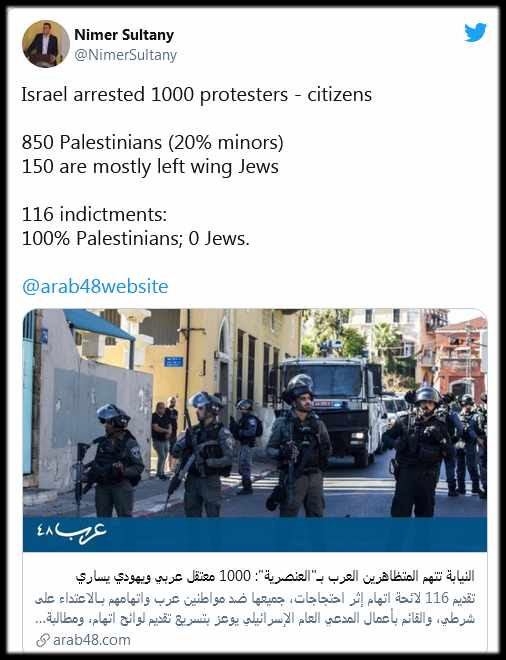
Israel is engaged in a policy of mass arrests against its Arab citizens (& a few left wing Jews). Three Jewish racists who took part in a brutal mob attack on a Palestinian man in Bat Yam this month were charged with attempted murder and aggravated assault. More than 20 attackers were seen on video beating the victim but only four have been arrested and just three charged.
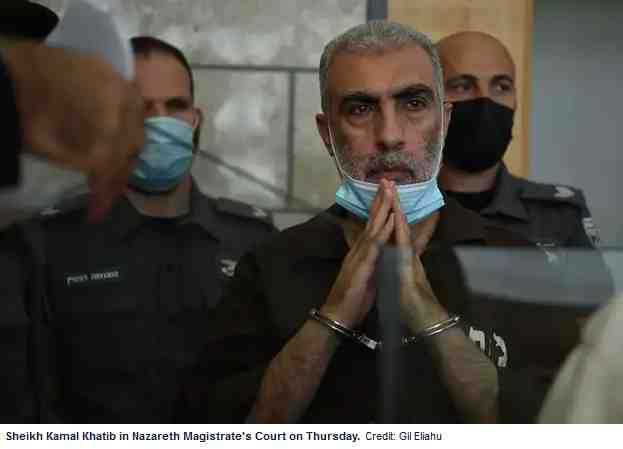
Since May 9 Israeli police and Shabak (security services) have detained more than 2,000 Palestinians inside Israel. The detention of Sheikh Kamal al-Khatib in Kafr Kanna (north of Nazareth) on May 14 was the most dramatic. As the police surrounded the Sheikh’s home, local residents spontaneously organized a mass demonstration against his detention, and soon there were clashes with the police. The police used live ammunition to disperse the crowd, and Mako reported that eleven of the demonstrators were evacuated for medical treatment, at least four of them in severe conditions.
The Israeli Police never use live fire against Jewish citizens. Even in the case of Shira Banki, the 16 year old girl who was murdered at Jerusalem’s gay pride demonstration in 2015 by Yishai Schlissel, a religious Zionist fanatic, the Police physically tackled him despite him wielding a knife, rather than shoot him. When Palestinians wield knives they are always shot at.
A ‘Death to the Arabs’ march – no one ever gets arrested for incitement at these marches
Sheikh al-Khatib, the Deputy Head of the Northern Islamic Movement, which Israel made illegal as part of its Islamaphobic policy, was arrested for ‘incitement’ remarks . No Jews are ever arrested, for racial incitement and Lehava, which physically attacks Israeli Palestinians suspected of sexual relations with Jews, is a legal organisation. Israelis whose Facebook name includes ‘Death to the Arabs’ are legally untouchable. This is Israeli Democracy in action.
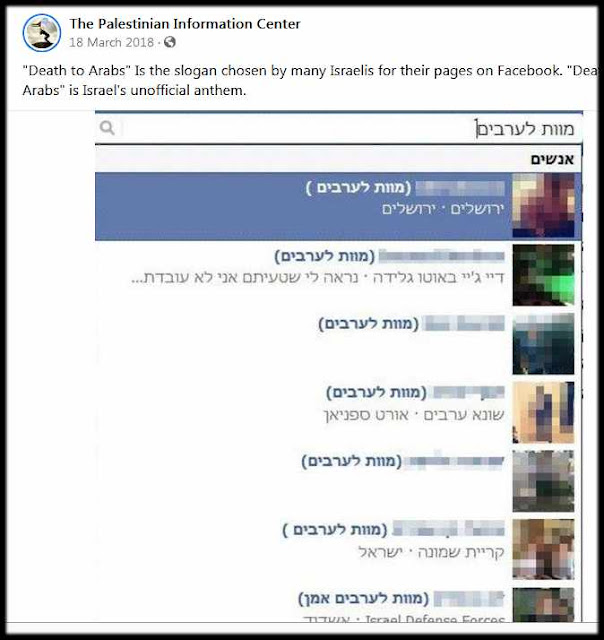
‘Maavet La’aravim’ (Death to the Arabs) is Israelis favourite Facebook Moniker
Following the attack on Gaza and the General Strike of Palestinians, inside Israel and the West Bank, the Zionist pretence that Israeli Arabs are equal citizens has been abandoned. Apartheid is becoming more and more obvious as Israeli security forces engage in overt repression . This demonstrates, not their strength but their weakness.
The solidarity movement needs to recognise what is happening to argue that the Israeli state as a Jewish state is an illegitimate state.
Tony Greenstein
What happened in the ‘torture room’ at Israel’s police station in Nazareth?
Lawyers from Adalah – The Legal Center for Arab Minority Rights in Israel have collected multiple sworn affidavits testifying to rampant, systemic Israeli police attacks and brutal beatings of Palestinian protesters, innocent bystanders, children, and even attorneys inside Nazareth’s police station during the period of protests in the city in May.
The graphic testimonies from victims, attorneys, and paramedics on the scene tell a story of systemic Israeli police brutality and physical, verbal, and psychological abuse of Palestinian citizens of Israel in the northern city, and indicate that Israeli officers ran a “torture room” inside the Nazareth police station – an informal term whose initial use may be traced to the recent detainees and lawyers on the scene.
Adalah submitted a formal complaint to senior Israeli officials today, Monday, 7 June 2021, regarding serious failures on the part of Israeli police and investigators in Nazareth that amount to grave criminal offenses, starting on 9 May 2021 and continuing for a number of days.
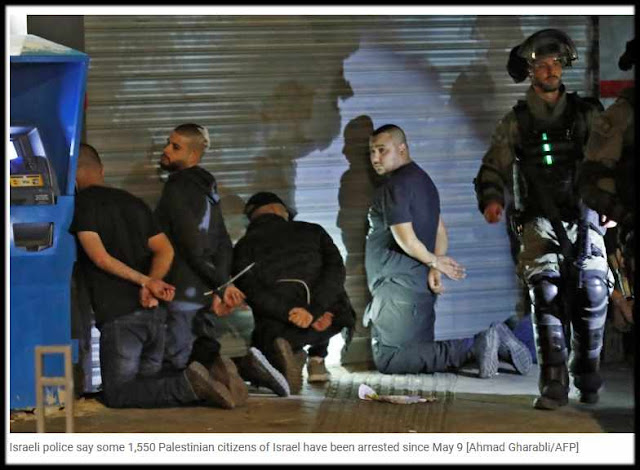
In their letter, Adalah attorneys Nareman Shehadeh-Zoabi and Wesam Sharaf highlighted brutal, overt Israeli police violence in Nazareth in breach of the rights of Palestinian citizens grabbed off the street and held in the station, including the rights to liberty, dignity and bodily integrity, as well as the right to counsel and due process.
Israeli “police officers led the detainees to a room located on the left side of the entrance corridor to the station, forcing them to sit on the floor handcuffed, to lower their heads towards the floor, and began to beat them on all parts of their bodies, using kicks and clubs, slamming their heads against walls or doors, and more. Officers wounded the detainees, terrorized them, and whomever dared to lift his head upwards risked more beatings by officers. According to affidavits, the floor of the room was covered in blood from the beatings.”
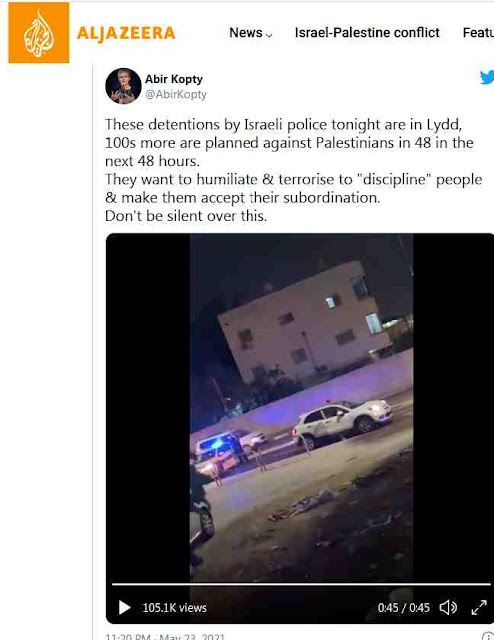
Most of the violent arrests of and attacks on Palestinian citizens of Israel in the city were carried out by Israeli special police forces, including undercover mista’aravim officers posing as Palestinians. Israeli officers would continue beating, shoving, and choking detainees while walking them from the scene of their arrest to the city’s police station.
Additional testimonies indicate Israeli police prevented Palestinian detainees in the Nazareth station from receiving urgent medical care for wounds resulting from beatings and attacks by officers, also another extremely serious criminal offense.
Almost every night during the Nazareth protests, ambulances were summoned to the police station and wounded Palestinian detainees were evacuated to the city’s hospitals. Other detainees appeared in court following their arrests displaying clearly visible signs of abuse and violence, including stitches on their head, facial swelling, scratches, and extensive bruising.
Sworn testimonies collected from attorneys on the scene indicate Israeli police in Nazareth also attacked them and their colleagues, who were seeking to provide legal aid to Palestinian detainees, used force to distance them from the station, seized telephones and even detained a lawyer.
Adalah demands immediate criminal probe of Israeli police torture
“What happened inside the police station in Nazareth amounts to torture and ill-treatment, and requires the immediate opening of a criminal investigation to examine the circumstances and conditions of the protesters’ detention at the station – including the investigation and prosecution of police officers involved in the violence,” Adalah attorneys wrote in the letter.
Faiz Zbedeiat, 21, university student, Nazareth resident
The protesters stood in a circle … and I stood about 6-7 meters away from them. After a while, a police officer approached the scene and announced over the loudspeaker that the gathering was forbidden and demanded that the participants disperse. When I heard this, I stepped back so that it was clear that I was not part of the rally. I was on the phone with a friend, and a second after I hung up, the cops threw a stun grenade into the street. Suddenly, I noticed a Border Police officer running towards me, and when he got to me he punched me in the nose. I immediately said: “I’m standing far away [from the protest], what have I done? I didn’t do anything.” He suddenly started yelling at me, cursing me, hitting me again, and he said, “Don’t talk to me, talk to the interrogator.” I immediately said that I was not resisting… Two more policemen arrived, grabbed me and pushed me towards another Border Police officer who grabbed me, hit me, and tried to slam my head against the wall. I asked why they were hitting me when I’m not resisting. I even I put my hands behind my back even though they didn’t handcuff me. Nevertheless, the same Border Police officer hit me in the nose with the walkie-talkie that he was holding. I raised my hands above my head to protect myself, and this angered him and he started cursing and threatening me.
The cops dragged me, grabbing me by the head and forcing me to look down. I was taken to the police station a few minutes’ walk away. On the way to station, the same cops continued beating me even though I wasn’t resisting at all. On the way, we met a policeman who appeared to be an officer, and he started laughing and said to them: “Did you only arrest him? That’s not enough. We need more.”
[In the Nazareth police station], police brought more detainees into the room, some of them minors who were nevertheless held together with us rather than being separated. At this point, the cops started beating us and kicking us with their feet and batons. [My friend] who was next to me, received a blow that caused a head wound which began to bleed. The blood could be seen on the floor. I told him he should ask for immediate medical attention, but he was afraid that if he asked for help they would beat him again. The cops kept saying “Close the door.” No one was allowed to raise their head; whomever raised his head or spoke was beaten more. I saw one guy who had a broken nose, his face covered in blood, and yet they kept hitting him inside the room. One of the police officers had an M-16 rifle and I saw that he used it to hit detainees. There was a moment when I could take a glance back and see that a police officer who was beating the detainees was masked.
The cops hit us in the back, slapped us in the face. I personally was hit in the back. They tried to hit me in the head but I dodged the blow, so they hit me in the stomach and slapped me in the face. I remained calm and composed the whole the time, but those who resisted or reacted were beaten more. The cops kept trying to provoke us, they cursed and threatened us. For example, during the adhan (Muslim prayer), they started laughing and saying “Pray that God will get you out of here.” After awhile, a police officer approached me and whispered in my ear, threatening me. He cursed my mother, my sister, and my wife. He then asked, “Did you understand?” I didn’t answer, and he immediately slapped me in the face. He asked me again: “Do you understand?” I still didn’t answer and he slapped me again in the face. Finally, he said “Go explain to your friends”. He pushed me back down to the floor and hit me again.
I saw deliberate humiliation of the detainees. I saw one of the cops kicking a detainee in the leg. Another officer came over and said to him “That’s not how you beat someone,” and kicked the detainee harder. The two cops started laughing.
Omaiyer Lawabne, Nazareth resident
On the eve of Eid el-Fitr and the last day of Ramadan, my brother and I and two other friends decided to go out and celebrate with two friends. We left the house around 21:00, and went to the “Checkers” store near the parking lot on Hagalil Street in Nazareth. I parked the car there, and we went to withdraw money from an ATM. I immediately noticed many police forces in the area, some of whom were well-equipped and looked like special units, as well as a demonstration that was taking place nearby. When I saw this, I started to walk away slowly in order to distance myself a bit. At one point, I looked to my right and saw a police officer in full gear running towards me with his fist raised in the air. The officer hadn’t appealed to us, hadn’t called out to us, hadn’t demand that we identify ourselves or stop. As soon as he saw us, he came running towards me with his fist raised in the air. But the thing is, we were just standing there, away from the demonstration, in a place where no one was gathering.
When I saw the police officer running towards me, I was scared, and I knew he was going to hit me. Out of fear, I started running. I wanted to stop and explain to him that I hadn’t done anything, but when I looked back I heard someone call out “Throw it, throw it,” and I realized that they were referring to stun grenades. The cops started throwing grenades at me, and I kept running because I knew that if I stood still I could be badly wounded by the grenades… While I was still running, one of the policemen raised his hand and hit me in the left eye, and I fell to the ground.
I covered my face while begging the cops who surrounded me to release me because I hadn’t done anything. Suddenly, one of the cops started kicking me in the face and head, stepping with his boot on my head and then on my shoulder. Several cops gathered around me as I lay on the ground. They began to hit me, both kicking and punching. I felt intense pain all over my body, from my head to my legs. One of them started kicking me in the artery behind the ear. At that moment, I thought I was going to die.
After a few minutes, two of the cops dragged me to the city police station. I tried to explain to them that I hadn’t done anything, but when I tried to speak they started punching me in the stomach… I saw that every detainee they brought into the station, they would slam his head against the door. I tried to keep my head away from the door as I didn’t want a scar that would stay with me for life but they still tried to slam my head against the door.
When we entered the station, we continued straight and turned left through a doorway. One of the officers immediately started cursing me and my family, and another slapped my face. There were a lot of detainees in the room, and I was shocked to see that they looked like prisoners of war: They were forced to sit on the floor, with their legs folded under their bodies and their heads held down. One masked officer was walking around the room with an object in his hand – I couldn’t tell if it was a club or something else – but everyone who raised his head was hit on the head with this object. They pushed me down into a corner and I lowered my head and curled up. Nevertheless, the same police officer hit me hard on the head with that object.
Seconds later I felt a great pain in my head, I saw that there was a large amount of blood coming down from a head wound, and I felt very dizzy… When they saw this, the police dragged me out, and ordered me to put my head under a tap of water. I told them I wouldn’t put my head under the tap because it would aggravate the pain and aggravate the bleeding, that they are also not doctors, and I didn’t need diagnosis by cops but rather professional medical treatment. One of the cops told me to shut up and hit me on the stomach. I felt threatened so I followed his orders and put just part of my head under the tap, so that it wouldn’t harm the wound. The officer then told me to “put my whole head under the faucet”, held me by the neck, and forced me to put the wound under the faucet.
A few minutes later two paramedics came to me. As soon as they saw me, they immediately decided to take me to the hospital… When the ambulance arrived, the officer who hit me in the head demanded to explain to the paramedics what had happened. I replied that the officer had beaten me with some object, but the officer – in an attempt to cover up my accusation – rejected my explanation and said, “Wrong. You were hit by a rock” [thrown during the demonstration]. I replied that I was not at the demonstration at all, and that police had in fact photographed me at the entrance to the station without any wounds and without bleeding, so it could be seen that I was therefore wounded only after being brought into the station.
That night I was released from hospital directly home rather than back to the police station. I couldn’t sleep for two nights because of the pain and dizziness. I couldn’t eat because of pain from the blows to my stomach. If I tried to eat, I would start vomiting. My chin hurt and I couldn’t speak well. It was the first time I had been arrested, an arrest that I believe was illegal, pointless, and very violent. Since then, I have not been summoned to the police station for any questioning or to provide testimony.